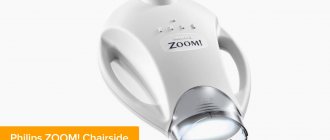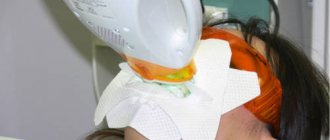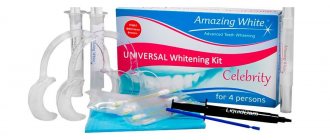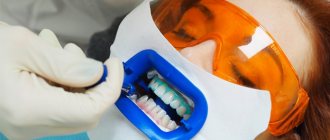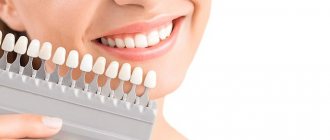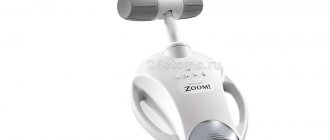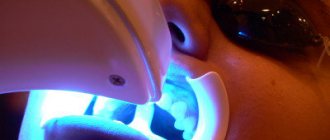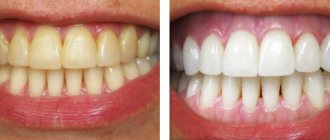In modern society, one correct and definitely useful trend has emerged - to pay close attention to the condition of your teeth. People strive to get the perfect Hollywood smile with straight white teeth, realizing that such a smile is not only an aesthetic appearance of the face, but also an opportunity to successfully build different relationships - personal and business. Teeth whitening is one of the services of modern dentistry that helps a person acquire an ideal smile.
For teeth whitening in a clinic (professional whitening), different technologies are used, and one of them is ZOOM 4. We will talk to you about the Zoom 4 teeth whitening method in this article: after reading the material, you will get acquainted with the features of Zoom 4, find out the indications and contraindications to this type of in-office whitening, the stages of whitening will also be discussed and a review will be provided in which Zoom 4 is compared with other methods of professional teeth whitening. We will not ignore the issue of price for the ZOOM 4 whitening service in Moscow.
Features of teeth whitening Zoom 4
Zoom technology is patented by Discus Dental. The essence of the method is as follows: a special gel is applied to the surface of the teeth, the action of which is activated by the light of an ultraviolet lamp. As a result of light exposure, oxygen molecules are released, which penetrate dental tissue and destroy coloring pigments.
Zoom 4 whitening technology, which is the latest version of Philips' development, features a number of solutions that significantly increase the comfort and safety of the procedure.
Features of ZOOM technology
The Zoom method, like other professional options for lightening tooth enamel, is based on the use of gel pastes containing hydrogen peroxide and amorphous calcium phosphate. To activate the process, a special lamp is used - a source of ultraviolet rays. It greatly enhances the whitening properties of the composition applied to the teeth.
Under the influence of UV light, the gel begins to release oxygen, which can penetrate even the deepest layers of enamel, oxidize and eliminate accumulated pigments. Together with oxygen, calcium phosphate is also transported to internal tissues. It settles in those areas where the coloring pigment was “washed out”. Immediately after removing the gel base, the phosphate crystallizes - a beneficial remineralization reaction is observed.
Benefits of Philips Zoom 4 Teeth Whitening
The most effective and gentle whitening - under this motto, Philips launched its new product on the market. The Zoom 4 kit includes an LED lamp with various intensity settings, Philips ZOOM! Chairside, as well as Relief ACP tooth sensitivity reducer. Previous generation systems have a similar set of components. However, the old composition of the whitening gel could not be called ideal. In Zoom 4 it was seriously improved, which helped reduce the negative impact on dental tissue.
Is Zoom 4 teeth whitening harmful?
Any type of whitening is safe if it is performed by a qualified professional following protocol, as well as certified equipment and supplies.
pros
- The hydrogen peroxide content is 25%, which is the lowest level compared to previous Zoom systems.
- The whitening gel contains calcium phosphate to restore enamel.
- Philips ZOOM! Chairside does not overheat dental tissue and has a flexible system of settings.
- To prevent tooth sensitivity, an effective remedy is used - Relief ACP gel.
- The procedure takes on average no more than 45 minutes.
Carrying out a procedure in dentistry
Whitening “Zoom 4”, reviews of which are positive, should be carried out only in a professional dental clinic.
Zoom 4 device
Then the procedure will give maximum results and will not bring side effects.
Rules for patients
The whitening procedure with the Zoom 4 system cannot be performed if you have inflamed gums, caries and other dental diseases. So before it, a complete examination and treatment of the oral cavity should be carried out. You will also need to replace existing fillings with temporary ones. Otherwise, in the process they will change their shade and become noticeable.
You should also perform professional cleaning, during which plaque and stone are removed and the enamel surface is polished. This procedure will not only improve the appearance of your teeth, but will also make them more susceptible to whitening. After this, dentists recommend a course of enamel mineralization. This measure will help prevent tooth sensitivity.
Preparatory stage
Immediately before the whitening session, teeth should be isolated from the rest of the mouth. And cofferdam, a special latex fabric, will cope with this task better. The exposed parts of the gums will need to be treated with a hardening gel. You can also use a special mouth guard.
But in this case, it is necessary to treat the exposed parts of the gums, the inside of the cheeks and lips with a protective composition that will prevent burns. It is also advisable to protect the patient's eyes with dental glasses.
Main part
The whitening procedure itself should be carried out according to the following algorithm:
- A gel consisting of an alkaline component and hydrogen peroxide should be evenly applied to the 10 upper and 10 lower dental units.
- The treated area must be exposed to a UV lamp, which activates the whitening process. The session takes 15-20 minutes. Then you should apply a new portion of the gel to your teeth and apply a lamp to it. This procedure can be repeated one more time if necessary.
- At the end of the session, you will need to remove the remaining whitening composition, and treat the dental units with a remineralizing gel, which strengthens the enamel and reduces the sensitivity of the oral cavity.
Duration
The duration of the procedure depends on the initial color of the enamel and the desired result. As a rule, all stages of whitening take about 60 minutes. But if your teeth need to be whitened by only 4-5 shades, then the session will take about 30-45 minutes.
Feel
Since during the session whitening occurs under the influence of cold halogen light, the enamel does not heat up. And accordingly, the procedure does not cause any sensations. In some cases, mild discomfort may be felt the day after the session. But you can easily get rid of it by simply brushing your mouth with a paste designed for sensitive teeth.
What side effects might there be?
Whitening Zoom 4 may cause some side effects. But, according to doctors, negative reactions arise only as a result of an incorrect procedure:
- Gum irritation. A similar problem occurs if the gums were poorly treated with a protective composition. Then the bleaching gel gets on them, causing irritation.
- Pulp damage. This situation occurs if the preliminary preparation was poorly carried out, caries is not healed and the crowns are not sealed. In this case, the bleaching gel enters the pulp through the lesions, causing severe irritation and pain.
- The occurrence of cervical erosion. This problem is caused by poor-quality treatment of exposed dental necks with a protective composition. Cervical erosion is accompanied by severe pain, and its treatment is quite lengthy.
With frequent whitening systems, teeth become unnaturally white, which looks unattractive. Also, due to repeated procedures, the quality of the enamel decreases and the teeth become sensitive.
Differences between Zoom 4 and Zoom 3
There are no conceptual differences between two generations of the same technology. It's all about the nuances.
✔
Firstly, all components and tools of Zoom 4 are from one manufacturer. Their maximum compatibility allows you to achieve the best results.
✔
Secondly, the Zoom 4 whitening gel contains a number of additional elements that reduce the negative impact on the enamel and promote its active restoration.
✔
In addition, Zoom 4 contains less hydrogen peroxide: 25% versus 35% in Zoom 3. This ten percent difference is very important. The alkaline composition, which is applied along with the gel, helps to minimize this impact.
Thanks to the balanced composition and the introduction of new developments, hypersensitivity after teeth whitening with the Zoom 4 system can be observed for only 7-10 hours, after which the patient practically does not feel any serious discomfort. In terms of safety, comfort and painlessness, Zoom 4 is superior to Zoom 3, not to mention earlier systems. On the other hand, the efficiency of Zoom 3 is about the same as that of Zoom 4.
Do it yourself or dentistry at home
It would seem that it has long been clear that procedures related to one’s own health are best left to professionals. After all, in the end, going to a doctor will be the most economical way both in terms of time and costs. Self-medication, at a minimum, does not lead to the desired results, and in the worst case scenario, it creates new problems, the elimination of which will require both time and money.
To whiten teeth at home, specialized toothpastes are used, as well as whitening strips and pencils. However, in most cases, the effect of use is minimal or absent altogether. The reasons for this lie in the fact that the recommendations for the use of these products specified in the accompanying manuals do not take into account many factors - such as age, dental condition, the presence of dental defects or chronic diseases, as well as inflammatory processes. Not to mention that many people prefer not to read any instructions at all. The result can be disastrous - without solving one problem, you will acquire new ones in the form of specific complications.
Even if you carefully follow all the instructions, avoid products that promise a miracle effect in just a day or hour. Such technologies simply do not exist! The trick of some unscrupulous manufacturers may come down to the inclusion of a dye in the composition. As a result, your teeth will actually turn white for a short time, but after the first brushing or a couple of meals, all the whiteness will quickly disappear.
In a situation where the problem is not so significant, the most reasonable action would be to consult a dentist, who will be able to prescribe medications for home use in accordance with an individually developed program. In more complex cases, whitening should be done in the dentist's office.
How does whitening with the Zoom 4 system work?
For the procedure to be effective, preparation for Zoom 4 teeth whitening involves professional hygiene. In order to prevent increased sensitivity of teeth, remineralizing therapy is also carried out in combination with brushing. One whitening session can consist of several cycles of 10-15 minutes. After whitening, Relief gel is applied to the enamel to reduce tooth sensitivity.
How to get to us
Our dental clinic is conveniently located in the center of Moscow, not far from the Patriarch's Ponds, at Bolshoy Kozikhinsky Lane, building 10. The clinic can be reached on foot in just 10 minutes from the Tverskaya or Pushkinskaya metro station. To do this, use the metro exit to Tverskaya and Bolshaya Bronnaya streets. Walk along Bolshaya Bronnaya Street along Novopushkinsky Square. At the corner with Bolshoi Kozikhinsky Lane, turn right (the landmark is a bistro with green walls in a corner house). On the right side of the alley, on the light green building at number 10, you will see our sign.
Sign up for a free consultation
Whitening results
Several factors influence how bright and light the shade of your teeth will be. The first is smoking. The more cigarettes a patient smokes, the sooner the teeth will darken from nicotine stains. To prevent this from happening, you should either give up the bad habit or regularly undergo professional cleaning.
The second factor is the innate shade of the enamel. There are 16 of them in total, and there are teeth that are very dark by nature. The darker the natural pigment, the more effort you will have to put into bleaching.
The third factor is illness or taking medications that affect the color of teeth (fluorosis, tetracycline antibiotics, etc.). Such stains may be difficult to whiten. The whitening result will last from 3 to 5 years, provided proper and regular care (home hygiene, professional cleaning every six months).
Indications and contraindications of the method
The procedure is used to whiten the enamel by several tones. This may be required in several cases:
- if desired, add additional whiteness to your smile;
- with the formation of pigmented plaque from smoking;
- with pigmentation from taking tetracycline antibiotics;
- after a course of orthodontic correction with braces.
Despite its safety, lightening the enamel surface of the teeth using the ZOOM-4 method cannot always be carried out. The following prohibitions exist:
- children's age (up to 16 years);
- pregnancy and breastfeeding;
- oncology;
- dental diseases;
- periodontal disease in the acute stage;
- exposure of the roots of dental elements;
- a course of antibiotics and regular use of oral contraceptive pills;
- mental illnesses;
- allergy to the components of the chemical complex.
Before the procedure, the dentist conducts a visual examination and collects anamnesis regarding existing contraindications. After analyzing the list above, we can conclude that some prohibitions are temporary. So, if you have problems with your teeth, it is enough to eliminate them. Then you can perform bleaching. The same applies to a course of antibacterial therapy or taking contraceptives. If there are absolute contraindications, the patient will have to abandon the idea of chemical lightening. But don’t be upset, the enamel can be lightened a couple of tones using the Air Flow hardware cleansing method.
.
Care and diet after teeth whitening Zoom 4
Any type of bleaching imposes a number of restrictions, the compliance with which directly determines the effectiveness of the procedure. In the case of Zoom 4 technology, it is very important to follow a diet after whitening is completed.
List of recommendations after whitening Zoom 4
- Eliminate from your diet all foods and drinks that tend to stain your teeth. First of all, these are coffee, tea, sweet carbonated drinks, wine, beets, carrots, ketchup and dark chocolate. It is advisable to avoid the above foods for at least a week.
- For two days, completely eliminate tobacco use. It is advisable to quit smoking for a month or at least significantly reduce the number of cigarettes per day.
- Comprehensive hygiene using floss, irrigator, high-quality toothbrush and toothpaste with minimal abrasiveness (at least during the recovery stage after whitening).
- Regular visits to the dentist for preventive examinations and professional hygiene.
When you can’t whiten your teeth using the Zoom protocol
To lighten the tone of the enamel, you need to prepare. It is prohibited to carry out the procedure if:
- caries;
- fillings that need to be urgently replaced;
- oncology;
- severe inflammation of the gums and mucous membranes of the oral cavity;
- unclosed enamel chips;
- allergies to dental compounds to be used;
- pregnancy, as well as during breastfeeding.
What results can be achieved using the ZOOM method
According to the developers, the technology makes it possible to lighten the enamel by 12-15 tones. But in practice, the results are usually more modest. On average, in one visit to the doctor it is possible to whiten teeth by 8 shades.
It is also important to consider that the whitening gel that must be used during the procedure is not very effective against changes caused by taking antibacterial drugs. It easily copes with food stains and stains caused by smoking. And it has a worse effect on other provoking factors. It also does not completely lighten teeth damaged by fluorosis.
The maximum effect obtained after using Zoom lasts one year. It all depends on what a person eats and drinks, and whether he smokes. To maintain a snow-white smile for as long as possible, you need to minimize the consumption of coloring foods and try to stick to a “colorless” diet. ZOOM whitening can be repeated 1-2 times a year.
